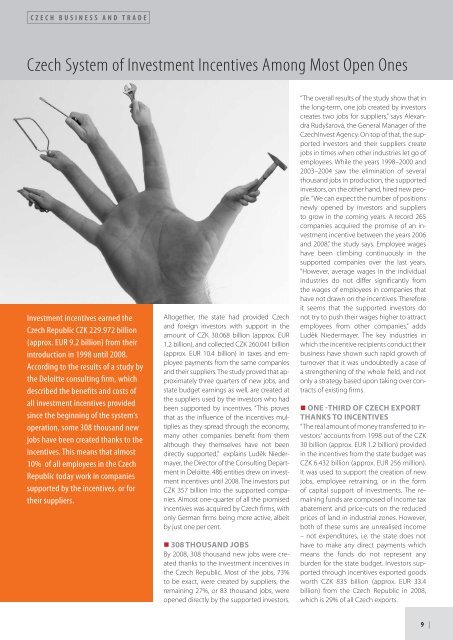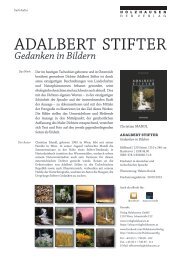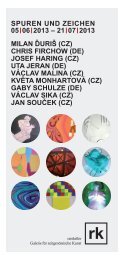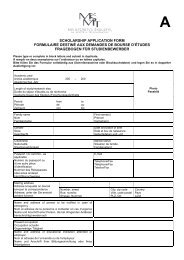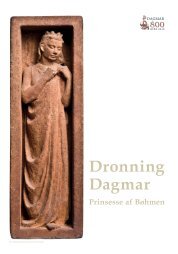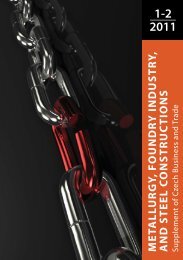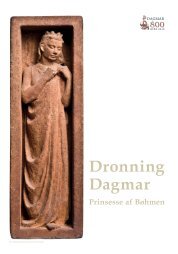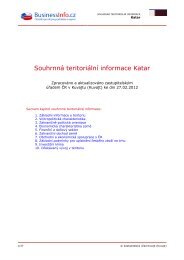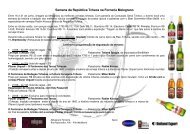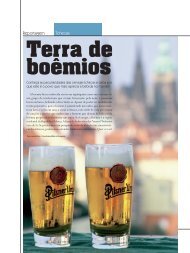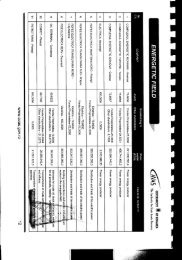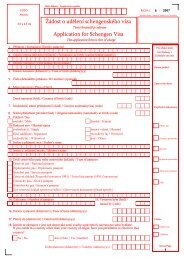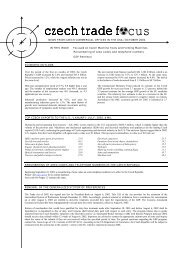czech pavilion at 2010 expo - MZV ÄŒR
czech pavilion at 2010 expo - MZV ÄŒR
czech pavilion at 2010 expo - MZV ÄŒR
Create successful ePaper yourself
Turn your PDF publications into a flip-book with our unique Google optimized e-Paper software.
CZECH BUSINESS AND TRADE<br />
Czech System of Investment Incentives Among Most Open Ones<br />
Investment incentives earned the<br />
Czech Republic CZK 229.972 billion<br />
(approx. EUR 9.2 billion) from their<br />
introduction in 1998 until 2008.<br />
According to the results of a study by<br />
the Deloitte consulting fi rm, which<br />
described the benefi ts and costs of<br />
all investment incentives provided<br />
since the beginning of the system‘s<br />
oper<strong>at</strong>ion, some 308 thousand new<br />
jobs have been cre<strong>at</strong>ed thanks to the<br />
incentives. This means th<strong>at</strong> almost<br />
10% of all employees in the Czech<br />
Republic today work in companies<br />
supported by the incentives, or for<br />
their suppliers.<br />
Altogether, the st<strong>at</strong>e had provided Czech<br />
and foreign investors with support in the<br />
amount of CZK 30.068 billion (approx. EUR<br />
1.2 billion), and collected CZK 260.041 billion<br />
(approx. EUR 10.4 billion) in taxes and employee<br />
payments from the same companies<br />
and their suppliers. The study proved th<strong>at</strong> approxim<strong>at</strong>ely<br />
three quarters of new jobs, and<br />
st<strong>at</strong>e budget earnings as well, are cre<strong>at</strong>ed <strong>at</strong><br />
the suppliers used by the investors who had<br />
been supported by incentives. “This proves<br />
th<strong>at</strong> as the infl uence of the incentives multiplies<br />
as they spread through the economy,<br />
many other companies benefi t from them<br />
although they themselves have not been<br />
directly supported,” explains Luděk Niedermayer,<br />
the Director of the Consulting Department<br />
in Deloitte. 486 entities drew on investment<br />
incentives until 2008. The investors put<br />
CZK 357 billion into the supported companies.<br />
Almost one-quarter of all the promised<br />
incentives was acquired by Czech fi rms, with<br />
only German fi rms being more active, albeit<br />
by just one per cent.<br />
� 308 THOUSAND JOBS<br />
By 2008, 308 thousand new jobs were cre<strong>at</strong>ed<br />
thanks to the investment incentives in<br />
the Czech Republic. Most of the jobs, 73%<br />
to be exact, were cre<strong>at</strong>ed by suppliers, the<br />
remaining 27%, or 83 thousand jobs, were<br />
opened directly by the supported investors.<br />
“The overall results of the study show th<strong>at</strong> in<br />
the long-term, one job cre<strong>at</strong>ed by investors<br />
cre<strong>at</strong>es two jobs for suppliers,” says Alexandra<br />
Rudyšarová, the General Manager of the<br />
CzechInvest Agency. On top of th<strong>at</strong>, the supported<br />
investors and their suppliers cre<strong>at</strong>e<br />
jobs in times when other industries let go of<br />
employees. While the years 1998–2000 and<br />
2003–2004 saw the elimin<strong>at</strong>ion of several<br />
thousand jobs in production, the supported<br />
investors, on the other hand, hired new people.<br />
“We can expect the number of positions<br />
newly opened by investors and suppliers<br />
to grow in the coming years. A record 265<br />
companies acquired the promise of an investment<br />
incentive between the years 2006<br />
and 2008,” the study says. Employee wages<br />
have been climbing continuously in the<br />
supported companies over the last years.<br />
“However, average wages in the individual<br />
industries do not diff er signifi cantly from<br />
the wages of employees in companies th<strong>at</strong><br />
have not drawn on the incentives. Therefore<br />
it seems th<strong>at</strong> the supported investors do<br />
not try to push their wages higher to <strong>at</strong>tract<br />
employees from other companies,” adds<br />
Luděk Niedermayer. The key industries in<br />
which the incentive recipients conduct their<br />
business have shown such rapid growth of<br />
turnover th<strong>at</strong> it was undoubtedly a case of<br />
a strengthening of the whole fi eld, and not<br />
only a str<strong>at</strong>egy based upon taking over contracts<br />
of existing fi rms.<br />
� ONE -THIRD OF CZECH EXPORT<br />
THANKS TO INCENTIVES<br />
“The real amount of money transferred to investors‘<br />
accounts from 1998 out of the CZK<br />
30 billion (approx. EUR 1.2 billion) provided<br />
in the incentives from the st<strong>at</strong>e budget was<br />
CZK 6.432 billion (approx. EUR 256 million).<br />
It was used to support the cre<strong>at</strong>ion of new<br />
jobs, employee retraining, or in the form<br />
of capital support of investments. The remaining<br />
funds are composed of income tax<br />
ab<strong>at</strong>ement and price-cuts on the reduced<br />
prices of land in industrial zones. However,<br />
both of these sums are unrealised income<br />
– not expenditures, i.e. the st<strong>at</strong>e does not<br />
have to make any direct payments which<br />
means the funds do not represent any<br />
burden for the st<strong>at</strong>e budget. Investors supported<br />
through incentives <strong>expo</strong>rted goods<br />
worth CZK 835 billion (approx. EUR 33.4<br />
billion) from the Czech Republic in 2008,<br />
which is 29% of all Czech <strong>expo</strong>rts.<br />
9 |


